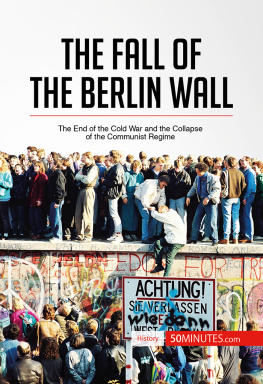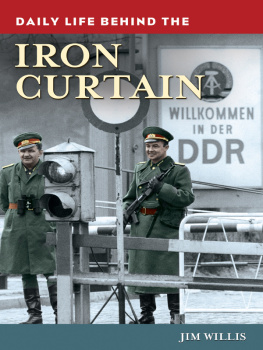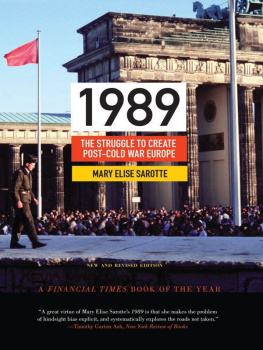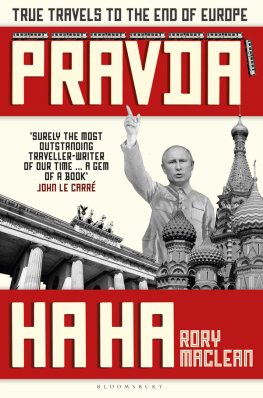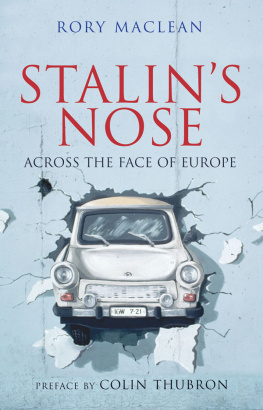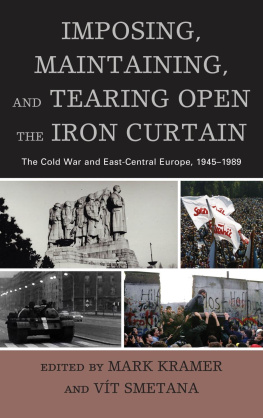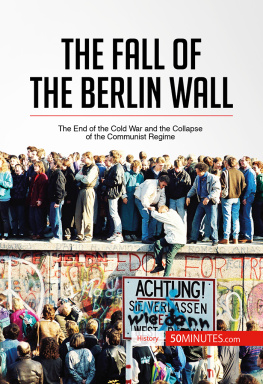ADDITIONAL PRAISE FOR 1989
Professor Sarottes vivid account of the events in 198990 that brought about the unification of the two erstwhile German states is the most balanced, thoroughly researched, and gracefully written account of those events that I have encountered. It sets standards for accuracy and style of presentation that will be difficult for other scholars to meet, much less surpass. Jack F. Matlock, Jr., former U.S. Ambassador to the Soviet Union, Cold War History
The tragic hero of 1989, for Sarotte, is Gorbachev. He was, and is still seen by many Russians as a King Lear figure: a man prepared to give away what he should have retained to a west bent on extracting as much as possible from the Soviet collapseunder the cover of honeyed words and rhetoric of a new age. John Lloyd, Financial Times
[A] truly great book.[A] whodunit of world politics that uses sources from Germany, the U.S.A., Russia and other countries to reveal both the details and the drama of the year of German unification in an unprecedented fashion. Stefan Kornelius, Sddeutsche Zeitung
This is a cracker of a read, a fast-paced policy study of a year that transformed Europe and the world. Australian
Sarottes book is compact and highly interpretive. Yet Sarotte has thoroughly mastered the original source material in all the key countries. She distills it with great skill, constantly enlivening her account with a sensibility for what these changes meant in life and culture. Hers is now the best one-volume work on Germanys unification available. It contains the clearest understanding to date of the extraordinary juggling performance of Kohl. Philip D. Zelikow, Foreign Affairs
Much the most exciting of these books [on the end of the Cold War] is Mary Elise Sarottes 1989. In contrast to the other authors, Sarotte treats the uprisings and collapses of that year as a prelude to the biggest change of all: the struggle to create post-Cold War Europe, as her subtitle puts it.Sarotte [is] a lucid and compelling writer. Neal Ascherson, review of a group of books on 1989, London Review of Books
Her analysis reminds readers once again that history does not just unfold and outcomes are not preordained Stimulating reading for a general audience, students, and faculty/researchers. H.A. Welsh, Choice
What if someone wrote a history that told the story from all sides, one that drew not only on memoirs and press accounts and the earlier work of scholars but also on the archives of nearly all the principal parties to the conflict, a history that included interviews with the diplomats, politicians, and activists who took part in events? And what if someone wrote this history analytically, parsing out the major decisions and events, remaining sensitive to the grays that shade human behavior, and avoiding definitive, black-and-white judgments designed to score political points? Mary Elise Sarottehas written such a history. William W. Finan, Jr., Current History
One of her many interesting themes is the question of how, in February 1990, the U.S. Secretary of State James Baker informally offered Gorbachev an undertaking that even though the unified Germany was to belong to NATO, the alliances jurisdiction would not shift one inch eastward. However, the haste with which Poland and other ex-Warsaw Pact states were drawn into NATO did much to compromise the chances of incorporating a chastened and susceptible Russia into a genuinely harmonious new world orderone of many telling arguments in Sarottes lucid and thoughtful book. Roger Morgan, International Affairs
The prose and style are lucid.[1989] is valuable to students, academics and general readers alike in learning more about these epochal happenings.[T]his is an excellent work which is likely to become a key text for this period. Alex Spelling, Diplomacy and Statecraft
Sarottes thoughtful conclusions are supported by prodigious scholarship [she] is an excellent writer and never allows the narrative to flag. Tom Buchanan, English Historical Review
Using multiple data from interviews with historical figures involved, biographies and extensive archival sources, she recounts the conversations, communiqus and personalities central to the events. This is a major contribution to scholarship in this field. Larry Ray, European History Quarterly
Sarottes outstanding book shows that Europes prefab post-1989 order was a messy improvisation, but at no point during the collapse of communism did conditions favorable to the alternatives cohere. Richard Gowan, International Journal
[Sarottes] highly engaging, well-paced account heightens the readers attention by making the high stakes of the negotiations clear, humanizing her principal actors, and capturing the mood and intrigue of the diplomacy. Sarah Snyder, Journal of Cold War Studies
The author embeds her interpretation in a sharp-eyed, fluent narrative of 19891990 that sees the realpolitik behind the stirring upheavals.[S]he offers a smart and canny analysis of the birth of our not-so-new world order. Publishers Weekly
1989
PRINCETON STUDIES IN INTERNATIONAL HISTORY AND POLITICS
G. John Ikenberry and Marc Trachtenberg, series editors
RECENT TITLES
Economic Interdependence and War by Dale C. Copeland
Knowing the Adversary: Leaders, Intelligence, and Assessment of Intentions in International Relations, by Keren Yarhi-Milo
Nuclear Strategy in the Modern Era: Regional Powers and International Conflict by Vipin Narang
The Cold War and After: History, Theory, and the Logic of International Politics by Marc Trachtenberg
Americas Mission: The United States and the Worldwide Struggle for Democracy, Expanded Edition by Tony Smith
Liberal Leviathan: The Origins, Crisis, and Transformation of the American World Order by G. John Ikenberry
Worse Than a Monolith: Alliance Politics and Problems of Coercive Diplomacy in Asia by Thomas J. Christensen
Politics and Strategy: Partisan Ambition and American Statecraft by Peter Trubowitz
The Clash of Ideas in World Politics: Transnational Networks, States, and Regime Change, 15102010 by John M. Owen IV
How Enemies Become Friends: The Sources of Stable Peace by Charles A. Kupchan
1989: The Struggle to Create PostCold War Europe by Mary Elise Sarotte
The Struggle for Power in Early Modern Europe: Religious Conflict, Dynastic Empires, and International Change by Daniel H. Nexon
Strong Borders, Secure Nation: Cooperation and Conflict in China`s Territorial Disputes by M. Taylor Fravel
The Sino-Soviet Split: Cold War in the Communist World by Lorenz M. Lthi
Nuclear Logics: Contrasting Paths in East Asia and the Middle East by Etel Solingen
Social States: China in International Institutions, 19802000 by Alastair Iain Johnston
Appeasing Bankers: Financial Caution on the Road to War by Jonathan Kirshner
The Politics of Secularism in International Relations by Elizabeth Shakman Hurd
Unanswered Threats: Political Constraints on the Balance of Power by Randall L. Schweller

Copyright 2009 by Mary Elise Sarotte
Requests for permission to reproduce material from this work should be sent to
Permissions, Princeton University Press
Published by Princeton University Press, 41 William Street, Princeton,
New Jersey 08540
In the United Kingdom: Princeton University Press, 6 Oxford Street, Woodstock,
Next page

